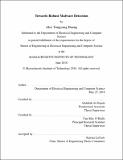Towards robust malware detection
Author(s)
Huang, Alex Yangyang
DownloadFull printable version (2.563Mb)
Other Contributors
Massachusetts Institute of Technology. Department of Electrical Engineering and Computer Science.
Advisor
Abdullah Al-Dujaili and Una-May O'Reilly.
Terms of use
Metadata
Show full item recordAbstract
A central challenge of malware detection using machine learning methods is the presence of adversarial variants, small changes to detectable malware that allow it to evade a model (i.e. be classified as benign). We take inspiration from adversarial variant generation methods in the continuous-valued image domain to introduce methods for malware in the binary domain. We incorporate these methods in the training of hardened models towards the goal of robustness against adversarial variants. Additionally, we provide visualization tools for analysis of hardened models. Our tools illustrate the difference in loss behavior between models trained with different methods, the effect of adversarial learning on the loss landscape of a model, and the effect of adversarial learning on the decision map of a model. The adversarial learning framework and the visualization tools in combination allow for the creation and understanding of robust models.
Description
Thesis: M. Eng., Massachusetts Institute of Technology, Department of Electrical Engineering and Computer Science, 2018. This electronic version was submitted by the student author. The certified thesis is available in the Institute Archives and Special Collections. Cataloged from student-submitted PDF version of thesis. Includes bibliographical references (pages 45-48).
Date issued
2018Department
Massachusetts Institute of Technology. Department of Electrical Engineering and Computer SciencePublisher
Massachusetts Institute of Technology
Keywords
Electrical Engineering and Computer Science.